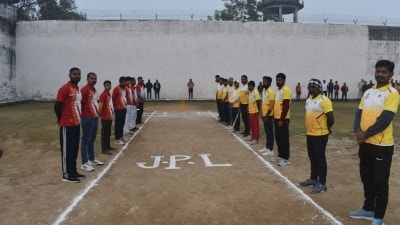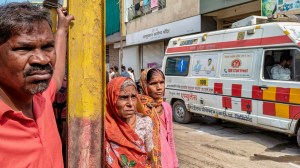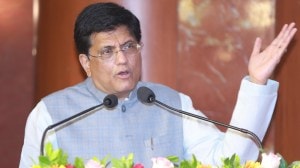Bye Annus Horribilis
The year 2002 is drawing to a close. Looking back, it was a horrible year, and it has left me quite despondent. There have been horrible yea...

The year 2002 is drawing to a close. Looking back, it was a horrible year, and it has left me quite despondent. There have been horrible years in the past decade, but none that ended with so many question marks about the future of the country.
Actually, it need not have been so bad. In purely economic terms, the worst period was the second half of 2000-01. Every indicator was headed south, and the year recorded a GDP growth rate of 4 per cent. Miraculously, there was a recovery. Just look at the growth rates for the four quarters of 2001-02 see accompanying graphic.
I cannot immediately recall another year in which all three sectors registered increasing growth rates in the four quarters of a fiscal year. It was a gift from the Gods.
Fiscal 2002-03 should, therefore, have been launched with a bang. All indicators were moving north, and at that point of time no one could have forseen a bad southwest monsoon. It was a glorious opportunity. Parliament should have opened with a confident speech from the President. The Budget should have unveiled more reform measures. The Prime Minister should have inducted new 8212; and young 8212; blood into his Cabinet. Chief Ministers should have been exhorted to pay greater attention to implementation and issues of governance. Sadly, nothing of that kind happened.
Instead, Yashwant Sinha presented a disastrous budget. His proposals hit savings, hit investments and hit the hard-working and tax-paying salaried middle class. On the same day, a horrendous crime was committed at Godhra in Gujarat. That act of madness was seized upon to unleash more and pre-meditated madness; and a cunning swayamsevak sowed the seeds of revenge and coldly calculated the harvest of hate that he would reap by the end of the year. The Prime Minister and the Home Minister fought for political space, the Home Minister raised the decibel level of his Pakistan-bashing and emerged a clear winner. The BJP8217;s allies, always insecure, scrambled to take new political positions. POTA became the favourite talisman as if it would deliver us from all evil. Disinvestment became everyone8217;s favourite whipping boy. At the level of the States, there were endless quarrels with Cauvery taking the top slot.
The Gods did not take kindly to such callous misgovernance. There was a poor monsoon, giving rise to legitimate concern about the kharif crop. But one kharif does not determine the whole agricultural year. There could be late rabi, there could be a normal rabi harvest and that is how the 8216;8216;unprecedented8217;8217; drought has actually played out. Yet, instead of pulling all efforts together and managing the drought situation, the Government 8212; and especially the Ministry of Agriculture 8212; launched into a period of mourning and killed whatever business and investment confidence that was left in the economy.
Nothing has been done right by the government since February 2002. One by one the pundits have lowered their forecasts of economic growth in the current year. RBI8217;s forecast of 6.0 to 6.5 per cent made in April 2002 is nowhere in sight and Dr Bimal Jalan will be a lucky man if his latest estimate of 5.0 to 5.5 per cent proves correct. The lowest estimate is by CMIE which forecasts a growth rate of only 3.1 per cent in fiscal 2002-03. That will make it the worst annual GDP growth rate since reforms began in 1991.
Apart from the economic woes, there is the new and dangerous political dimension introduced by the results of the elections in Gujarat. In the last four days of the campaign, in meeting after meeting, Narendra Modi unashamedly declared, 8216;8216;This is not an election about who will form the government or who will be Chief Minister. This election is about religion.8217;8217; And that is how it was in central Gujarat, the region most affected by the communal riots. The other regions 8212; south Gujarat, north Gujarat and Saurashtra 8212; tell a different story. In each of them, the Congress won a few more seats than what it had won in 1998 and the BJP lost a few seats that it had won in 1998. The BJP8217;s net loss was 18. Central Gujarat turned the tables. The BJP8217;s tally went up from a modest 14 to a record breaking 42, a gain of 28 seats and, hence, a net gain of 10 seats. Godhra falls in this region, and we were told that if one draws a circle with Godhra as the centre and a radius of 100 kilometres, the BJP won all, or nearly all, the constituencies that fall within this area. Religion, as Modi wanted, was the sole issue.
|
It was a gift from the Gods. All three sectors registered increasing growth rates in the four quarters of 2001-02. Fiscal 2002-03 should have been launched with a bang. Instead, Yashwant Sinha presented a disastrous budget. On the same day a horrendous crime was committed at Godhra. That was seized upon to unleash more madness. The Gods did not take kindly to such callous misgovernance |
The Gujarat verdict is a defeat for the moderate, the liberal, the secular and the reformist sections of Indian society. It is a defeat for those who believe that governance should be the sole issue in an election. The BJP will be tempted to apply the Gujarat formula 8212; if it can find a few more willing Modis 8212; in Himachal Pradesh, Rajasthan and Madhya Pradesh which go to the polls next year.
Our cup of woe is filling up. Besides Gujarat, there are the new scandals that have hit the nation with frightening regularity. A sober and straight judge enquiring into the Tehelka tapes was lured into a trap and forced to quit both jobs. Judges in Punjab, Rajasthan and Karnataka are embroiled in allegations of sleaze and sex, and the last word has not been heard on these matters. Nagappa was killed by his abductor Veerappan, who remains untraced. A Joint Parliamentary Committee has virtually indicted the then Finance Minister, but he remains unfazed and unmoved. The Comptroller and Auditor General has pointed to more irregularities 8212; and possible corruption 8212; in the purchases made during the Kargil war, but George Fernandes continues to preside over the crucial Ministry of Defence. The Supreme Court has stayed the Hinduja trial 8212; a trial that it had only in May 2002 expressly directed shall continue from day to day.
The gathering clouds 8212; dark and threatening 8212; leave one bewildered and numb. There are, of course, some silver linings. The highway building programme is on course and is generating employment and demand. Parliament is actually passing bills, thanks to the two presiding officers. An unusually informal President is inspiring children with his dreams. Good men are still available to do important jobs 8212; Dr Rangarajan will head the Finance Commission. And be grateful for small mercies, Vajpayee has not quit in favour of Advani or Modi. Though pitifully few, I am counting the silver linings.
Email the Author
- 01
- 02
- 03
- 04
- 05































